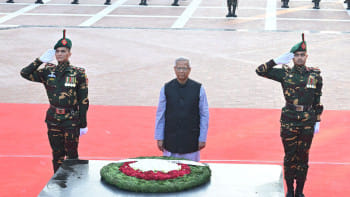No interference

Inter-parliamentary Union yesterday adopted a resolution calling for non-interference in any country's internal affairs.
The 18-point resolution, however, allows intervention when a state fails to protect its people from "incitement to commit, and the commission of, genocide, war crimes, crimes against humanity and ethnic cleansing".
In the resolution, titled “The role of parliament in respecting the principle of non-intervention in the internal affairs of states” was jointly placed by Russia and Cyprus in a session of the five-day 136th IPU assembly that began on Saturday at the Bangabandhu International Conference Centre in the capital.
In a session of the Standing Committee on Peace and International Security, 44 states voted in favour of the resolution and 10 voted against it.
Countries that voted for the resolution include Bangladesh, Russia, China, Cyprus and Kenya.
The 10 countries that voted against it were Canada, Denmark, Finland, Germany, Iceland, Norway, Sweden, Switzerland, UK and Ukraine. Belgium refrained from voting.
The resolution underlined the role of parliaments in preventing external intervention that threatened states' sovereignty and independence.
The first point of the resolution says, "The principle of refraining from the threat or use of force and the principle of non-intervention in the internal affairs of sovereign states are part of the fundamental pillars of international law and international relations."
The resolution also stressed the responsibility of parliaments to strengthen democracy, promote, protect and encourage respect for human rights, support dialogue, encourage the peaceful settlement of internal dispute, take all necessary action to consolidate national unity and peaceful negotiation among different sectors of society.
It emphasised prevention of forcible overthrow of democratically elected and legitimate governments, in accordance with states' obligations under international humanitarian law and human rights law.
"The people of each country have the inalienable right to determine their own political future, and freely pursue their economic, social and cultural development in accordance with the international law," read the resolution.
It acknowledged that climate change, terrorism, war and refugees as "great challenges which mankind is facing today".
Such challenges could no longer be met by one state alone, and an ever-closer cooperation of parliaments across the world was needed, it said.
The resolution noted that democracy, good governance and development were inextricably linked and underscored the need to maintain support for democracy in times of economic hardship.
The draft resolution revised by the standing committee would be sent to the IPU steering committee, which would prepare it for incorporation in the “Dhaka Declaration” during today's concluding ceremony.

 For all latest news, follow The Daily Star's Google News channel.
For all latest news, follow The Daily Star's Google News channel. 



Comments